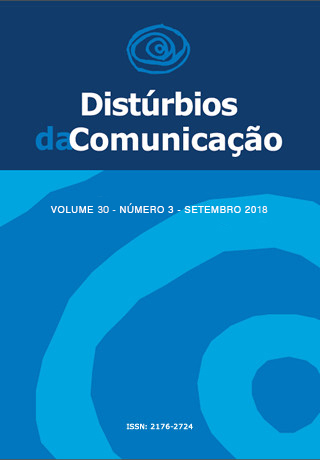Perception of parents on the effects of acoustically controlled hearing training in children
DOI:
https://doi.org/10.23925/2176-2724.2018v30i3p-542-550Keywords:
Nervous System, Nervous System Diseases, Hearing, Auditory Perception, Hearing Disorders.Abstract
The use of questionnaires can help to verify the perception of parents / guardians about their children’s hearing abilities. To compare the perception of the parents of schoolchildren submitted to acoustically controlled auditory training, in the initial and final moments, through a questionnaire called SAB Scale. Method: 18 children (66.6% boys) aged 6 to 13 years (mean of 10.4 years) underwent auditory training, 15 sessions of 45 minutes, after being diagnosed with Central Auditory Processing Disorder. This questionnaire contains 12 questions about auditory behavior which total score ranges from 12 (lowest score) to 60 points (highest score). These questions were grouped by domain: attention, hearing, learning, listening comprehension. Results: In the perception of parents / guardians through SAB scale, the greatest improvement was perceived in the field of hearing, followed by attention, learning and listening comprehension behaviors. Conclusion: The parents perceived evolution of the auditory behavior of their children with satisfactory improvement in the areas of hearing and attention. The understanding and learning domains did not reach the same improvement as before. The evaluation of the SAB scale serves as a guide in the school context if it is worked with teachers or caregivers.Downloads
Downloads
Published
Issue
Section
License
Copyright (c) 2018 Sandra Nunes Alves Viacelli, Aline Bovolini, Simone Sperança, Sônia Faria, Ricardo Oliveira Mello, Pablo Felicio Nepomuceno, Fátima Aparecida Gonçalves, Liliane Desgualdo Pereira

This work is licensed under a Creative Commons Attribution 4.0 International License.









